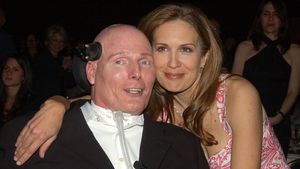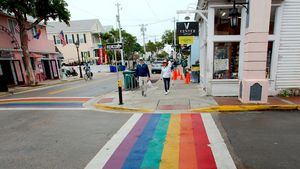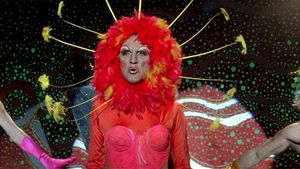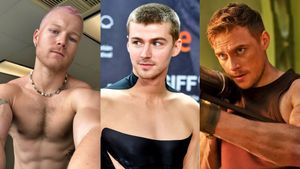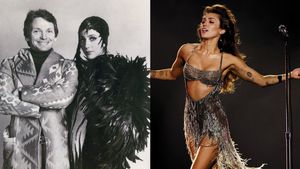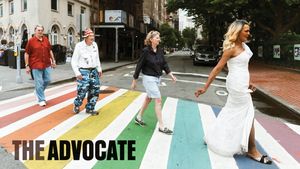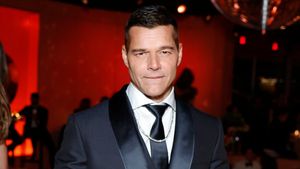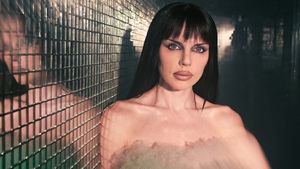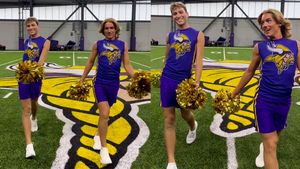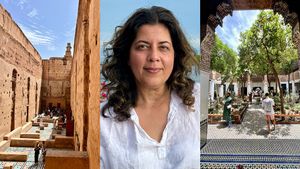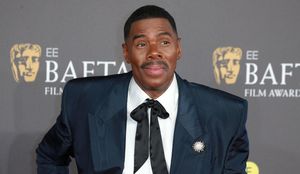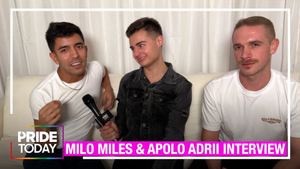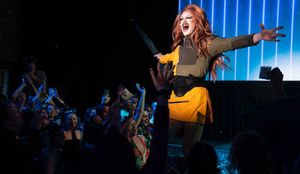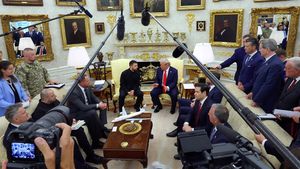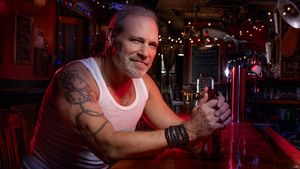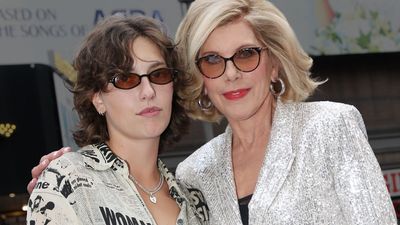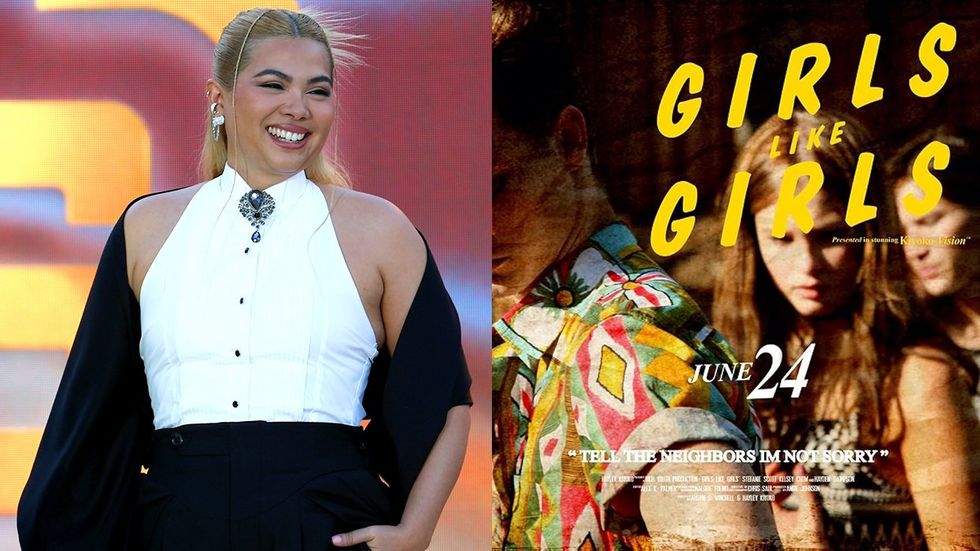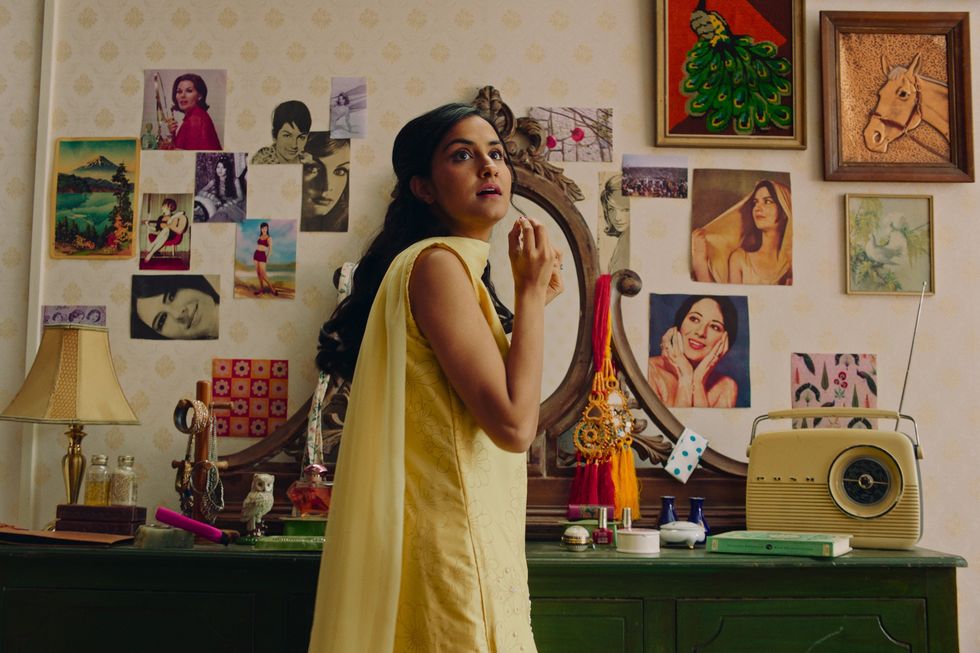Nearly fifteen years after the release for her first film, writer/director Alice Wu has returned to filmmaking with a moving story of love—and its many iterations.
The Half of It premiered on Netflix last Friday and has already garnered a rabid fanbase. Ellie Chu (Leah Lewis) is a reclusive teenager in the only Asian-American family in her small Washington town. She makes enough money to support her father by writing essays for her peers. When Paul (Daniel Diemer) propositions her to write a love letter for his crush, Aster (Alexxis Lemire), things get complicated when the two girls begin forming their own connection. But unlike any love triangle you've seen before, the collision of these three teens rocks the small town of Squahamish.
"I had to make up the town called Squahamish," Wu chuckles as she recalls the origin of the made-up town for PRIDE. "Otherwise, having lived in Washington state I was just going to get a bunch of hate mail from people in Washington, like, 'That's not how our town is.'"
Wu grew up in the San Francisco Bay area. The 49-year-old originally got her degree in computer science and spent her twenties in Washington state designing software until she quit her job and moved to New York. That's when her first film Saving Face, the powerful story of a Chinese-American mother and her lesbian daughter, came together.
But around 10 years ago, Wu left the industry to take care of her own mother. "I dropped everything, moved to San Francisco and that's where I've been. And I thought I'd totally left the industry."
Luckily for us, Wu has returned. PRIDE sat down with the critically acclaimed writer/director to chat about the new Netflix film, the power of empathy, and that happy ending.
PRIDE: First of all, it made me so happy to see an LGBTQ+ film led by a POC. This is still shockingly rare. Was that important to you when the movie was coming together?
Alice Wu: It was. I mean, if you saw my first film [Saving Face]...honestly the fact that that film got made at all is insane because it's an Asian American, lesbian, romantic comedy. It's half in Mandarin Chinese. And it's because I was a computer scientist and I had no idea...I mean I knew that was going to be impossible, but honestly the idea that I would make a film also seems impossible. So, if you're going to do something, why not make the thing you want to make?
I don't want to just make any film. It's very important that things come from an emotional basis of something that I feel. That there's a deeper reason. I made that one as a love letter to my mother and I made The Half of It because I was exploring something.
I think if you look at those films, the thing that's very similar is they both have very commercial hooks. You could easily make the same movie with an all-white cast, a big budget. The Half of It could easily be set in some huge high school in Orange County. And it could be more like a Bring It On kind of a thing. You know, girl helps guy get girl. And that would be a great movie. There's nothing wrong with that. But why would I make that movie?
That's the question. A bunch of people could make that movie. But for me, I think what I like to do is I like to take my sensibility. I like to show characters you don't usually see. Why not make the main character a Chinese immigrant? I can write that and that is sort of my contribution.
I truly think that the more specific you make characters, the more people can relate to them. And I learned that lesson on my first film because that film is so specific. The crazy thing is that Black people came up to me, Latino people came up to me, White people came up to me. A straight, white, European-American guy who was in his fifties came up to me and was like, "Oh my God, this is exactly like my family." That tells me what I always secretly believe, which is the more specific you are, the more universal. The more people will connect to that as a human being, it will connect your character as a human and then they access their own. They fill it with their own humanity.
And I think that's kind of where my wheelhouse is. On the surface, everything seems like this is just a sweet story. But my hope is that at the end of it, you relate to characters you don't think you might obviously relate to.
And if I can get this great white 55-year-old, conservative white guy, to relate to a 17-year-old, possibly closeted Chinese immigrant girl or her 50-year-old Chinese immigrant father, I've won, right? Because anytime you can increase the human capacity for empathy, that's ultimately what my goal is.
So that sort of drives my desire as a filmmaker and a storyteller. I'm used to living in a country where my experience is generally sort of more invisible and that we're sort of historically supposed to accept the mainstream experience. And what I try and do is, because I'm so used to empathizing with the mainstream experience, but the mainstream experience might not be used to empathizing with that of mine or of my friends so much. The secret goal is to get them to do that. I like telling stories that they start to relate to and then they're like, "Wow, I didn't realize I relate to this queer character."
But when it comes down to it, you could be a straight girl or a straight guy, but God, when you're in high school and you have a crush on someone and you can't tell them, it feels the same. That's kind of what I'm secretly trying to do.
I can easily imagine the main character being replaced with a white character because it's set in this small, white, working-class town.
You don't usually see the small, white, rural towns. That's something you don't always see in a teen movie. My goal is that kids and parents and people in red states will watch this movie. I've had people like, "Oh my God, that's exactly like the town I grew up in." I'm hoping they sort of feel the textures of that and then it makes them think about that one immigrant family or that one kid that everyone was calling a fag.
Oh, I didn't think about it in that way.
Yeah. You don't usually see those towns in a teen movie.
You did a very good job of making us empathize with all the characters. I didn't necessarily have any feelings towards Paul but by the end of the movie, I was so invested in Paul's wellbeing and I cared about him and his taco so much.
I'm so glad. Thank you. That's also a testament to all of the [actors] as well. To Daniel, who plays Paul. In the beginning, I was adamant about not casting stars.
Like I auditioned a bunch of teen stars, but I was like, no, I need to cast three fresh faces. At the time I cast Leah, she had not gotten onto Nancy Drew yet. The goal is that I need people to feel like these kids exist.
And with someone like a Paul, this cannot be some pretty boy that as soon as you see him, it's like, "Oh look, it's Noah Centineo." It's got to be like some kid where, as the movie goes on, he starts to grow on you, and our affection for him mirrors the trajectory of Ellie's affection for him.
And that helps us go on that journey.
Nearly every character in The Half of It is intertwined with religion and church, which can be tricky to navigate for many LGBTQ+ people. Why was that such an integral part of this story?
On our location scouting of 20 million small towns that were all exactly like this town, they all have like one big church, and maybe there's another one, but it kind of felt like the next one would be in another small town somewhere.
You have to kind of wonder, "Did this town arise because this was the church in that region?" So everybody who kind of goes to that church starts to build a house around it. That was way early in America that these little towns clustered. And an incredibly important character in this is the setting and the location.
I started to write [this film] this after Trump had been elected. I remembered having this moment...Many of us had this, where it's not like we did not know there was homophobia or we didn't know there was racism. Of course, we knew there was. Yet it was still jarring to be faced with all these people openly being happy about their impulses. That really caught me a little off guard. I think I just assumed most people knew what was wrong, but they still maybe had the attitude. I had this moment where I remembered being like, God, if I'm someone who fundamentally believes people are good, then what is this? Does this mean all these people are bad?
Well, if I'm very honest, I grew up in a very conservative, Chinese family. And you know, we were totally racist and sexist and homophobic and transphobic and, we weren't even transphobic, because at that point, I don't even think that was a thing that could cross their minds.
Hilarious because I'm an old Asian dyke now, right? Listen, I still have racist and sexist and homophobic attitudes that hopefully I've really worked past, but every now and then something still pops up and I'm like, "Oh my God, I have to work on that."
So knowing that, I'm thinking, "Well, are my parents bad?" And I don't think they are. Like I truly believe my parents are good people. They've also come very far in terms of their own understanding and so if that's the case, then I would like to believe that most people in those towns are still decent people.
In a weird way, it's my way of trying to find a connection and empathy with that world while showing some of the darker parts of it and how it affects our specific characters. I just believe that the straightest, most conservative kid in one of those towns has had feelings that any of our three main characters have had. I'm sort of writing this for that kid, where they're watching it and they're like, "Oh this my town." And then it might make them both feel seen and feel connected to a larger humanity.
Now in terms of the other part of your question about religion, I actually weirdly think I should spend an inordinate amount of time thinking about whether God exists. If I'm honest, I can't say for sure. I do pray but not to like a God per se, but to...I just sort of believe in the larger...or I shouldn't even say I believe. At some point, I chose to believe that there's a larger order to the universe, cause I just prefer the person I am when I do. And I prefer making my choices. Anything down to how you treat your friends, to what film are you going to work on, to what are your priorities in life? I like to make sure it adheres to a sense of a larger purpose that recognizes I'm just one of billions of people.
I think it's slipped into my writing. One of the most important parts of the movie is when Ellie says, "I don't believe in God." And when Aster's like, "That must be so nice." And she's like, "No, it's lonely."
That's just something growing up as a teen I felt a lot, you know?
(Warning! Spoilers ahead!)
The movie began with the quote, "People spend far too much time looking for someone to complete them," and it ends with all of them going their separate ways. It seems what you were trying to say is that their love triangle in the movie changed each character for the better. Why is that the story you wanted to tell over the stereotypical kind of "happy ending?"
I wasn't thinking of writing [the film] as a YA. In reality, I see it as a movie with teens in it, not a teen movie. This could be a movie in a nursing home with eighty-year-olds.
I honestly think we all regress to being teenagers when it comes to love. There's something about that time when you're just trying to figure out who you are, and the truth is all three of these characters are trying to figure out who they are, and nobody in their immediate world seems to care or understand.
Somehow in their collision, especially for Ellie and Paul, the least likely person on the world for her would be Paul as her friend. For Aster, honestly, it would also be Paul because he seems stupid, and then it's like wait, he's writing all these amazing things. As it turns out to be this incredible connection of Ellie, who is also not someone she might have thought. She's not even aware that there is a possibility there.
It's not so much that we all think we need to find our other half, but we as a society exalt romantic love. We make it seem like it's the most important love. And it is important. But I think it's just one of many kinds of love. None of them are more important than any other. It's something I've learned as I've gotten older.
I'm not a message movie maker, but the closest I would come to a theme is when Paul stands up in the church and he says, "I used to think there's only one way to love and now I know there's so many more."
He starts off the movie thinking as soon as he gets this girl, his life is complete. Midway through, it shifts to, "Wait, maybe it's not that girl, maybe it's this girl, and then my life will be complete." But what he's actually feeling for Ellie, he might feel romantic toward her but it turns out there's not going to be that sexual connection between them for all sorts of reasons. That doesn't diminish what they have together.
There's this sort of realization, that when you connect with someone who actually sees you for who you are and accepts you, there is a place where it gives you space to grow yourself. So that aspect you're looking for outside of you could actually just be inside you.
We shouldn't be spending all our time trying to find our other half. What we should be looking for are the people who help us expand the person we are to become that. That's really what I've learned. And that doesn't have to be sexual. It can be. It could be, some people meet a mate and that person is incredibly important and that's wonderful. But our society tends to tell us these stories where until that happens, your life is incomplete, which completely discounts all the other ways. Whether it's a friend or a parent and you know, being queer, we have our families but we also have our chosen families. And all of those people form who we are, right?
Truly, I think this is the happiest ending you could have for these kids.
Cause if you literally were like "Ellie and Aster are together," then what is that movie? They're stuck in this horrible town. Like, what? That's not the best thing for Ellie. The best thing for Ellie is she finally starts her life and goes somewhere where she can expand her mind. The best thing for Aster, she finally considered going to art school. In two years, who knows what will happen. Maybe they will cross paths again. Maybe they will be together, maybe they won't. But that's not the critically important thing. The critically important thing is they're starting their lives.
Watch PRIDE's interview with the stars and Wu, as well as the trailer, below. The Half of It is now streaming on Netflix.







